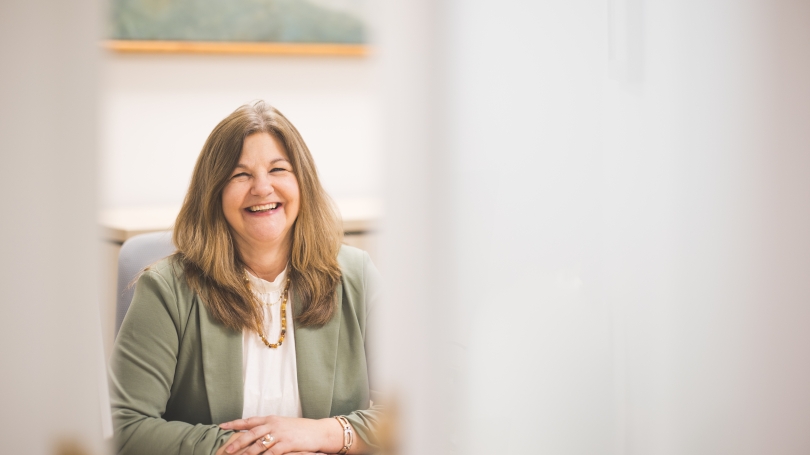
- About
- Departments & Programs
- Faculty Resources
- Governance
- Diversity
- News
Back to Top Nav
Back to Top Nav
Back to Top Nav
Back to Top Nav
Lisa LaFlam marks 30 years as assistant to the dean for faculty committees, playing an integral role in enabling faculty to shape the institution.
Lisa LaFlam relishes when she is asked to investigate how Dartmouth faculty in previous decades handled various governance issues.
This year, LaFlam marks 30 years as assistant to the dean for faculty committees (and 35 years at Dartmouth), a role that requires her to maintain a history of all the governance decisions and proposals considered by the Faculty of Arts and Sciences and other standing faculty committees—which she describes as "unique and a lot of responsibility."
"Senior leaders or other faculty deans come to me and say, this proposal was discussed by the faculty back in 1960, can you go back and research these records and find out what happened and what process was taken? It's an aspect of the job I really enjoy, having records handy to be able to do that," LaFlam says.
As part of her role, LaFlam keeps seven of the major committees of the Faculty of the Arts and Sciences running smoothly. She works closely with committee and faculty chairs to formulate meeting agendas, prepare background materials, and take minutes. LaFlam also ensures that important items make their way through the committee system, coordinates communication around outcomes, and manages the process of assigning faculty to serve on committees.
"I really enjoy being in the room and observing how these decisions come to fruition—seeing how faculty governance really works to shape the institution," LaFlam says.
"I think Lisa knows the ins and outs of faculty governance at Dartmouth better than anyone," says Susan Ackerman, Preston H. Kelsey Professor Emerita of Religion. "She can probably recite the contents of the faculty's core governing document—the Organization of the Faculty of Arts and Sciences at Dartmouth—in her sleep. And she always brings to her work a warm smile and good cheer."
Ackerman first met LaFlam as a member of the Committee on Organization and Policy in 1994 and says she quickly learned that "the most important person in the room" was Lisa. "And I really learned that two years later, in 1996, when I became the COP chair and had virtually no idea what I was doing," Ackerman says. "I depended deeply on Lisa to keep me and the committee functioning and on task, and I have seen her bring that same skill and guidance over and over to other Arts and Sciences committees on which I have served over the years or from whose work I have benefitted."
Committee members serve for three years, which means new members are constantly joining and others are ending their terms. It is LaFlam who provides critical institutional knowledge of previous discussions, decisions, and day-to-day processes.
"I really have to be the memory," she says.
Seven deans, from Wright to Smith
LaFlam first started working at Dartmouth in 1989, when she provided administrative support to faculty at the Tuck School of Business. From there, she moved to the President's Office and served as the assistant to the secretary of the Board of Trustees. She also began providing administrative support to search committees, which connected her with former Dartmouth president Jim Wright, who then served as dean of the faculty.
"I got to work closely with him and really admired him," LaFlam recalls.
When her current position became available in the Dean of Faculty Office, LaFlam was eager to take on the new role. "Knowing Jim and how much I loved working with him, and having the support from my supervisor, it just felt right," she says.
At the time, all the faculty committees were dispersed to different staff, so LaFlam's first big project was to bring them together under one office.
Over the years, LaFlam has continued to play a crucial role in several new initiatives, from transitioning committee meetings online during the pandemic to supporting the recent vote on the new school of arts and sciences.
"I think that was a really big example of faculty governance," LaFlam says. "How it worked really well to shape the future of the Arts and Sciences."
"It is impossible to overstate the importance of Lisa's role in shared governance at Dartmouth," says Jane Lipson, associate dean for the sciences and Albert W. Smith Professor of Chemistry. "Lots of faculty would likely make reference to her incredible institutional memory. As someone who has served on and chaired numerous faculty committees, I would highlight her infinite discretion, her imperturbable equanimity, and her rock-solid judgment. The faculty are extremely fortunate to have Lisa as a working partner over these decades."
When she's not working closely with faculty committees, LaFlam can be found volunteering with a local nonprofit animal rescue, overseeing rental properties, and spending as much time as possible with her new granddaughter.
"I'm very lucky that my children chose to stay in the area and so I get to see them," she says. "I look back and can't believe 35 years went by so quickly. And so it's really important to me to spend as much time as I can with my family."
At Dartmouth, she looks forward to playing a role in the changes to come.
"Over the next few years, faculty committees will be very busy deliberating changes to governance as we transition to the new school of arts and sciences," she says. "And I have a front row seat to all of this!"